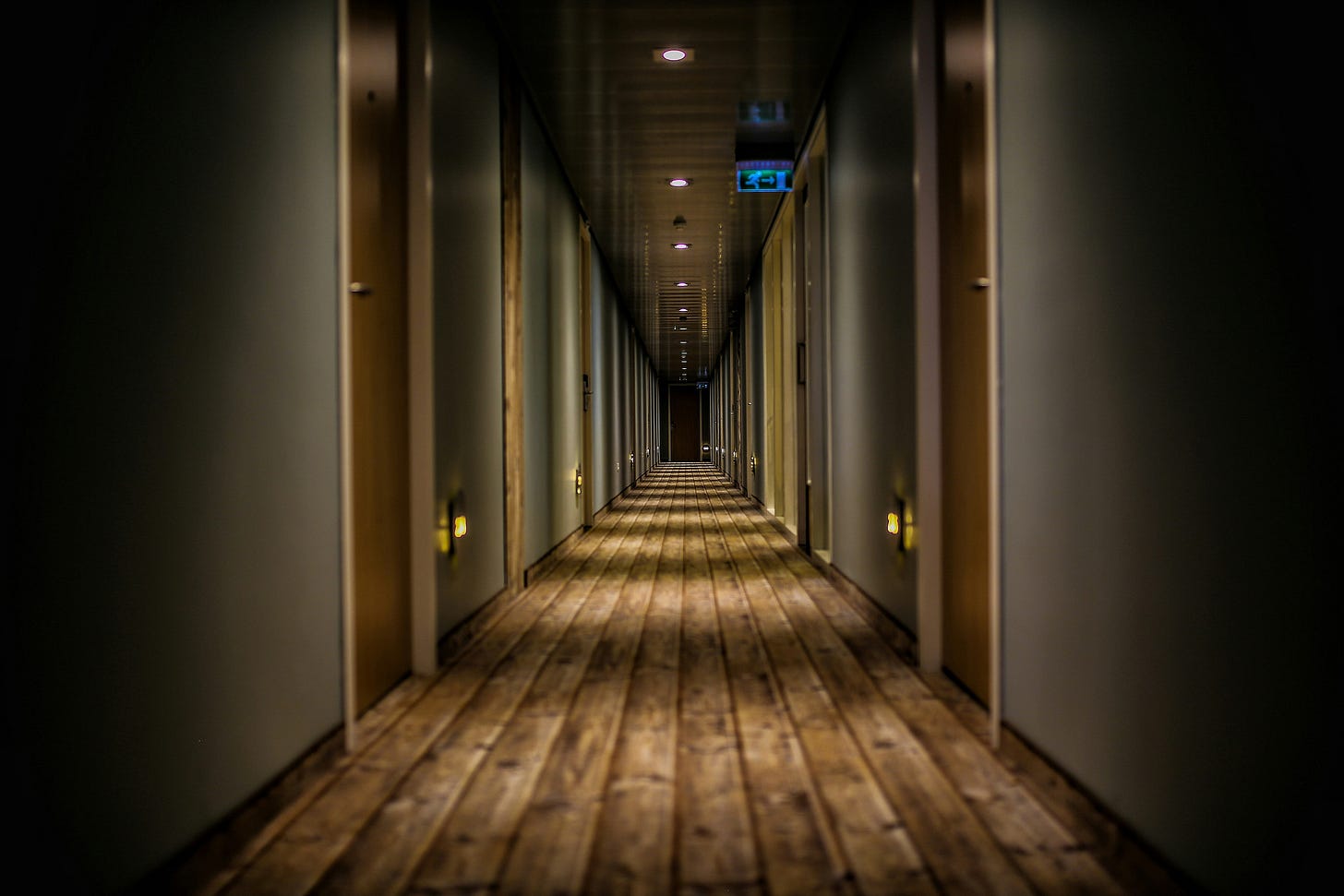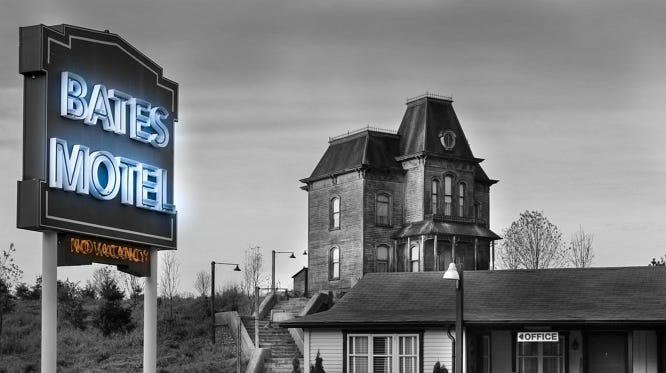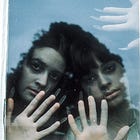The Hotel existed long before it was built. Its doors open into places unexpected. Staying in Room 63 is not advised. The Hotel has a way of concealing itself, but you’ll have no trouble finding your way there. Those who visit rarely visit by choice. Things disappear in The Hotel. Things return. We’ll be at The Hotel soon.
Booker shortlister Daisy Johnson’s fourteen-tale anthology chronicles the brief and beguiling history of a liminal Travelodge mired in the Anglian fens, from construction to conflagration. The stories are uniformly bijou, like hotel apartments themselves, sometimes discreetly connected, resonating with echoes of past events. The Hotel is a TARDIS of strange, beautifully built, masterfully subtle, exquisitely weird.
The stories focus on guests and staff – all female – each carrying baggage of yearning or trauma, sometimes sweet, often unbearable, always possessed of a strange magnetism.
Initially written as a commission for BBC Radio 4 in 20201 (broadcast during the UK’s lockdown) and collected in print four years later, The Hotel returns to the murky folk-horror of Johnson’s also-brilliant short story collection Fen (2017), midwifing the suppressed and unspeakable into outbursts of the ghostly and surreal.

As a literary haunted house story, it’s short, sharp fun. Like Josh Simmons’ graphic novel House, the book plays the anticipation game, generating dread by never showing you much of anything. Johnson has a gift for lines that haunt.
“I saw you in the reflection of ice on the road and at the funeral you sat behind me and breathed a name I no longer use into my ear.”
As a writer of feminist gothic, the author is far less baroque than Angela Carter, who could build sentences like the Palace of Versailles. Johnson’s prose is more pragmatic. Her paratactic sentences give equal measure, never surrendering to hysterics, creating a rhythm that feels so blandly conversational it comes as a shock to realise she’s just slipped in the knife.
“There’s a room none of us likes cleaning but someone has to do it so we take turns. Room 36. Things go missing in that room and it’s no good putting down a bottle of bleach and walking away, because by the time you come back it’ll be gone. As well as things going missing, sometimes things come back. I found a necklace in there that I lost when I was a child, something my father gave me as a bribe for silence and that I thought I’d left in the bin.”
The Hotel evokes Stephen King’s the Overlook (The Shining, 1977) and Robert Bloch’s Bates Motel (Psycho, 1959), two iconic tourist traps of American horror fiction. But The Hotel is much less objectively gothic. It doesn’t play like a psycho-thriller or some Amityville mystery. There’s no madman grinning behind the shower curtain, no restless spirit with a backstory in need of unravelling before it can be laid to rest.
The absence of guests at the Overlook and the Bates is part of what makes them so creepy. Their emptiness evokes failed Americana, public welcome turned private hell.
The Hotel (which bustles with guests by comparison) is more yielding and ambiguous, more like the subjective phantoms of Shirley Jackson’s The Haunting of Hill House (1959). Whatever walks here walks because someone brought it with them. The Hotel is a place with unfathomable roots, where distant moments in time can superimpose themselves upon each other like photographic negatives.
“Is it possible that The Hotel ceased when it burned down or is it not more likely that the land itself holds some forbidding sense of identity? What grows there now? Nothing. What doors are there in the ground? Many. And is it possible that even though The Hotel is gone there is still some days a flash of it, a startling after-image of a building, tall chimneys, open door?
It is not yet the end. It is time, tentatively, for a start.”
There’s no direct dialogue. The characters speak but feel as though they’re trapped behind museum glass. They don’t describe their palpitating hearts or blood freezing in terror. Johnson selects less hackneyed, more evocative details – an odd smile, elevator numbers that won’t move fast enough – inducing in the reader that sense of fear, isolation and threat without resorting to blunt descriptions.
“Once in the lift, going down, a woman with wide eyes smiled at me, showing her teeth.
I know you, she said.
I didn’t know what to say so I just stood there. There was no one else in the lift but us. I watched the numbers going, willing them faster. She smiled wider.
I know you.
I knew which room she was going to when she got off. She turned and watched me, smiling, through the closing doors.”
Clean is one of the book’s most disturbing stories. The most surreal is The Monster, a fairy tale-like piece about a protean entity that dwells in the walls of The Hotel and who falls in love with a guest so besotted with another woman that she would settle for a sinister simulacrum.
Conference is perhaps the most conventional.
It begins unremarkably as a graduate lands a job at a cool but vague corporation. (“Everything was so big and loud and the way they talked about it, everything was GREAT and FANTASTIC and they kept talking about OPPORTUNITIES and ROOM FOR GROWTH.”) She willingly succumbs to a vortex of overtime and Red Bull, before gradually admitting something’s wrong. (“There were small moments, uncomfortably gendered.”) She becomes voiceless, her agency a façade. Her colleagues treat her like a ghost, and that’s before she arrives at The Hotel for a conference.

The story is as crisply structured as anything in M.R. James.
“Let us, then, be introduced to the actors in a placid way; let us see them going about their ordinary business, undisturbed by forebodings, pleased with their surroundings; and into this calm environment let the ominous thing put out its head, unobtrusively at first, and then more insistently, until it holds the stage.”
M.R. James
From the introduction to V.H. Collins (ed.), Ghosts and Marvels (Oxford, 1924)
But for all their concise Jamesian structure, the stories in The Hotel are not about control. Their narrators aren’t striving to make sense of the strange events that befell them.
Your typical M.R. James narrator is a dependable academic, a chap of privilege and education rattled by an intrusion of the supernatural into their manly, orderly world of textbooks and museum pieces. Recounting events to the curious listener then becomes a ritual of regaining control. Like Holmes and Marple explaining the resolution of some beastly murder so that cosy middle-class England may endure, James’s narrators are putting the shattered pieces of their world back together, telling stories to restore the rational.
But the world of the female narrators in The Hotel can never achieve any such sense. These women aren’t trying to save themselves from some ghastly fate. They are already lost to it.
Like H.P. Lovecraft, Johnson’s outrage is more moral than intellectual. The horrors of The Hotel are expressions of a terror so formless and existential that it can never be exorcised, staked through the heart, or blown away by a silver bullet.
Like the fens upon which The Hotel once stood, its depths are unseen and ready to drown the unwary.
Stay weird.
The Hotel is available from several retailers via Penguin Books
And if you’re after yet more haunting short stories of the gothic and folkloric, try…
Fen (Daisy Johnson, 2017)
What Is Not Yours Is Not Yours (Helen Oyeyemi, 2017)
The Sing of the Shore (Lucy Wood, 2018)
Diving Belles (Lucy Wood, 2012)
Great and spooky novels by the same authors…
White is for Witching (Helen Oyeyemi, 2014)
Daisy Johnson’s debut novel Everything Under (2018, shortlisted for the Man Booker)
And her juicy, full-on horror novel Sisters (2020).
If this post got you smiling, thinking or ready to create, then please…
Or…
Every drop of reader support helps this project grow!








Brilliant piece of writing about a brilliant piece of writing.